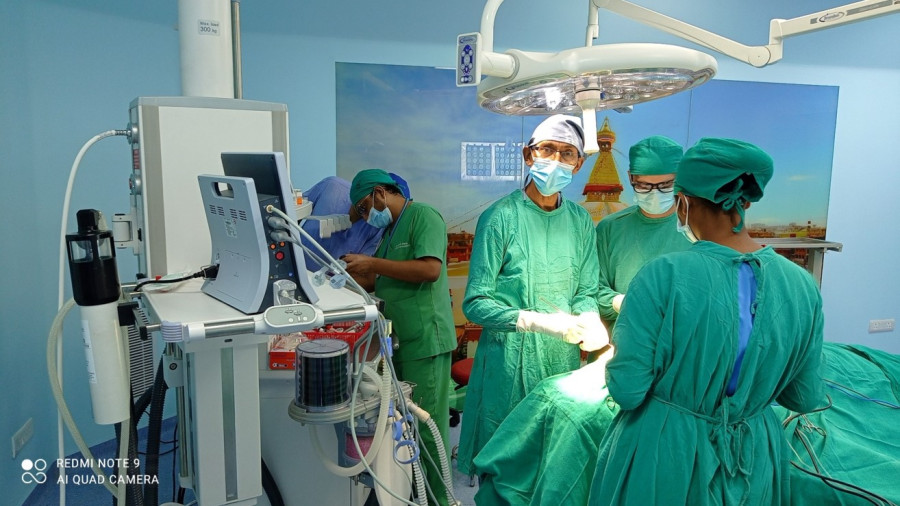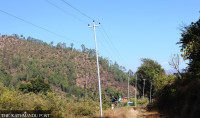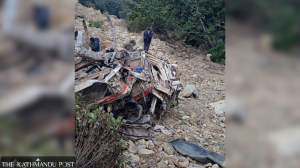Karnali Province
Karnali Provincial Hospital is providing critical medical care
It started kidney transplant services earlier this year. Doctors report influx of patients.
Jyotee Katuwal
A 22-year-old man in need of a kidney transplant had lost all hope of survival given his poor financial condition. A resident of ward 4 of Bardaghat Municipality in Nawalparasi, the man suffered renal failure five years ago and had been undergoing dialysis regularly.
He visited several hospitals seeking treatment for his condition, but returned disappointed after hearing about the cost of a kidney transplant. “Private clinics said the transplant would cost somewhere between Rs 1.5 million-Rs 2 million. We could not afford it,” he said.
But two months ago, he got a new lease on life at the Karnali Provincial Hospital in Birendranagar, Surkhet when he was selected for a kidney transplant free of cost.
“I was selected for the transplant at the hospital on the recommendation of the ward office,” he said. “The past five years have been hell for me. After the successful transplant, my life has changed for the better.”
The Karnali Provincial Hospital started providing kidney transplant services in mid-January this year in coordination with Shahid Dharmabhakta National Transplant Centre (SDNTC), according to general surgeon Dr Bikash Khadka.
The Nepal government provides cost for the treatment of eight serious conditions including renal ailments through certain government hospitals and dialysis centres. Apart from providing free dialysis services to patients with renal failure, the Ministry of Health and Population provides financial assistance for transplantation and medication to those from disadvantaged backgrounds.
“The hospital is becoming a hub for renal patients in Karnali province since kidney transplant services started earlier this year,” said Khadka. “Kidney patients from Karnali don’t have to go to Kathmandu any more to get a kidney transplant.”
Dr Pukar Chandra Shrestha, executive director of the SDNTC, said the start of kidney transplant services at the provincial hospital has lessened the load of hospitals in Kathmandu that provide free renal ailment treatments.
There are only three hospitals in the country that provide free kidney transplants—one each in Pokhara, Kathmandu and Surkhet. Patients from all over the country visit the SDNTC in Kathmandu for free kidney transplants.
The provincial hospital also provides other medical services besides renal treatments to the patients.
Naina Sunar, a 45-year-old woman from Suvakalika Rural Municipality in Kalikot, underwent a hip replacement surgery (hip arthroplasty) at the hospital a month ago. Like the 22-year-old kidney patient, she too visited several hospitals in the country before she went to the Karnali Provincial Hospital.
“I started having issues with my hips some five years ago. I went to Nepalgunj Medical College Teaching Hospital in Kohalpur, Tribhuvan University Teaching Hospital in Kathmandu, and a few other hospitals. While some hospitals provided the treatment I was looking for, the cost was too high,” she said.
“Hip replacement surgery costs around Rs500,000, but the provincial hospital said the procedure would not cost more than Rs200,000 at the hospital,” she said. Sunar is currently recovering with the help of physiotherapy. “Not everyone can afford medical services at private hospitals and since very few government hospitals provide the same services, people with limited means suffer from a lack of treatment.”
“We have been conducting hip replacement surgeries at the hospital for the past two years,” said Khadka. “Except for complex heart and cancer surgeries, the hospital is now equipped to conduct most medical surgeries. We don’t have to refer patients to hospitals outside Karnali anymore.”
The Karnali Provincial Hospital was established as a district hospital in 1962 and was upgraded into a provincial hospital in 2018.
Krishna Shrestha, a local man of Birendranagar-4, said that local residents are very happy with the new developments at the provincial hospital. “We used to go to Nepalgunj or Kathmandu even for minor medical emergencies. The provincial hospital either didn’t have the doctors or the equipment to provide treatment,” said Shrestha. “But now even complex surgeries are done here in Surkhet itself. It is a huge relief for us locals.”
According to Karnali Province Hospital, the hospital also conducts eye and obstetric fistula surgeries. The hospital runs a 17-bed treatment centre for obstetric fistula patients.
There are 300 beds at the hospital and an additional 19 beds in the Intensive Care Unit (ICU) and 13 beds in the Neonatal Intensive Care Unit (NICU). According to Professor Doctor Dambar Khadka, director of the hospital, around 191,000 patients received services through the outpatient department (OPD) last year. “Until five years ago, due to a lack of equipment, we were forced to refer patients to other hospitals, even in critical cases. Some patients died on their way to other hospitals because we couldn’t treat them here,” he said.
According to Binod Basnet, the information officer of the hospital, the hospital has 12 operation theatres in the hospital, and among them, six are modular operation theatres. A modular operation theatre is a free-standing structure constructed inside a hospital room. “Around 9,000 small operations are performed at the hospital every year. Around 6,000 patients underwent complex surgeries last year,” he said. “The number of patients increased by almost 54 percent this year compared to last year.”
Basnet said the hospital has been providing services such as general medicine, maternity, neurosurgery, paediatrics, gynaecology, ear, nose, and throat, orthopaedics, kidney diseases, dialysis, and blood transfusion, among others.
The Obstetrics and Gynaecology department is one of the busiest departments at the hospital, according to Gynaecologist Dr Kritika Thapa. “Since the establishment of the Nepali Army West Air Base in Surkhet in 2009, pregnant women with complicated conditions from remote Karnali and Sudurpaschim villages are brought to the hospital in army helicopters,” she said. “In the fiscal year 2022-23, a total of 5,425 women gave birth at the hospital, and among them, 1,475 were caesarean births.”
Although the hospital is making strides in providing quality medical services, it is still dealing with a lack of human resources.
“There are 325 posts for doctors, nurses and health workers at the hospital, and among them, 152 are permanent posts. The doctors currently here are either scholarship candidates or specialists working on a contract basis. There are 48 specialist doctors and among them, 22 are permanent hires. Similarly, there are 35 medical officers and 191 nursing staff,” said Basnet.
According to Director Khadka, the hospital is preparing to establish an Institute of Health Sciences to conduct Medicine (MD) Master of Surgery (MS) residency teaching programmes at the hospital.
“Once we get the government approval, there will be no shortage of specialist doctors at the hospital or in the other districts of the province. We also plan to upgrade the hospital to a 500-bed hospital in the future.”




 22.26°C Kathmandu
22.26°C Kathmandu












